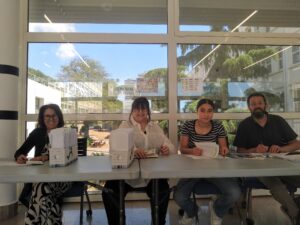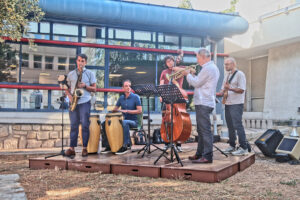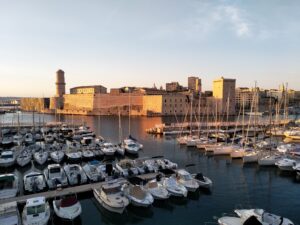“Shining light on matter through interdisciplinary theoretical approaches”
3-7 June 2024, Marseille (France)
The 27th edition of the ETSF Workshop was distinguished by its interdisciplinary focus. It served as an open forum to discuss various emerging topics such as ultrafast phenomena via non-equilibrium dynamics, attosecond time-resolved vibrational and electronic spectroscopy, and charge and energy transfer in solids, hetero- and nanostructures, including the role of point and extended defects and thermal effects. The development and application of the most advanced methods in the description of electronic excitations, such as multiscale and embedding methods as well as theoretical and numerical developments, have enriched the discussion.
The main topics were:
- Non-equilibrium dynamics
- Charge and energy transfer in solids, in hetero- and nano- structures
- Advanced methods in the description of electronic excitations
- Theoretical and numerical developments

The workshop was hosted by Aix Marseille University (AMU), whose development strategy is dedicated to interdisciplinary research. The meeting was attended by 100 scientists (from 16 countries), including many young researchers. The active participation of young researchers was encouraged by a large number of slots for contributed talks and an attractive poster session.
The workshop program consisted of 13 invited lectures (including 2 introductory lectures), 26 contributed talks, and a poster session with about 41 posters. As planned, ample time was allowed for informal scientific exchange (coffee breaks and social events). We hosted an evening lecture by a social and psychological cognitive expert (Isabelle Régner) to initiate a dialogue on the profound influence of gender stereotypes on students’ academic performance and their impact on evaluation, hiring and promotion decisions, affecting reviewers of all genders. It was a great success, as evidenced by the fact that it was followed by a long question and answer session.

The event was sponsored by the Psi-k organization, Aix-Marseille University, CNRS, Ville de Marseille, AMUTECH and Société Française de Physique – Provence.
Additionally, many speakers made their slides available here (upon login) to the workshop participants.
A Detailed Program and the book of abstracts are available on the website
Introductory lectures:
Nicolas Ferré, Aix Marseille University, France
Claudia Draxl, Humboldt University Berlin, Germany
Isabelle Régner, Aix-Marseille University, France
Invited speakers (theory):
Alicia Palacios, Universidad Autonoma de Madrid, Spain
Ivan Maliyov, Caltech, CINaM, Aix-Marseille Université, France Adam Gali, Budapest Univ. of Technology and Economics, Hungary
Bo Peng, Cavendish Laboratory, University of Cambridge, UK
Pier Luigi Cudazzo, University of Trento, Italy
Xavier Blase, CNRS, Institut Neel, Grenoble, France
Julien Toulouse, Sorbonne Université & CNRS, IUF, Paris, France
Maria Hellgren, CNRS, Sorbonne Université, France
Invited speakers (experiment):
Lou Barreau, ISMO, Universite Paris-Saclay
Alberto Zobelli, Paris-Saclay University, France
Michele Celebrano, Politecnico Milano, Italy
The organizers of the workshop were:
- Elena Cannuccia, Aix Marseille Université, France
- Maryam Azizi, Université Catholique de Louvain, Belgium
- Guido Fratesi, Università degli studi di Milano, Italy
- Vitaly Gorelov, LSI, CNRS, Ecole Polytechnique, France
- Roberta Poloni, SIMaP, CNRS, Grenoble, France
- Rajarshi Sinha Roy, Université Claude Bernard Lyon1, France
General remarks
There was an exciting yet friendly atmosphere throughout the conference. Participants enjoyed the question and answer sessions and reported that they were moments of open and constructive exchange. All in all, it was a very rewarding experience for everyone, participants and organizers alike. At the end of the 27th edition, we could note that a constant theme is the need to speed up calculations to make them practical for ever increasing system complexity, while the main topics have evolved from the ability to describe excitons in simpler systems to their coupling with other excitations or their role in advanced applications. At the heart of the ETSF community, scientific progress is driven by strong interactions between the network partners.
Conclusions and prospects
This workshop was very successful in all respects. The organizers are very pleased with the unexpectedly high number of participants, with the large number of experimentalists and local scientists who attended the workshop, and especially with the committed gender balance, with one third of the participants being female scientists (33 out of 100 participants).
All speakers did a wonderful job in preparing and delivering carefully prepared talks and poster presentations, and the participants responded very positively and contributed with their energy and enthusiasm to make the most of this workshop.
All in all we enjoyed all the informal moments we spent together, such as the traditional welcome evening accompanied by the musical performance of the CNRS Big Band; the boat trip to discover the National Park of the Calanques; and finally enjoying a picturesque sunset over the Vieux Port during the workshop dinner.
This event would not have been possible without the impeccable management of the PIIM laboratory at the University of Aix Marseille. In particular, Nathalie Bonifay, Marie Pierre Sergent and Guillaume Vinconneau deserve a special mention for working behind the scenes to ensure the smooth running of the entire workshop and for kindly offering to welcome participants at the registration desk. Special mention should also be made of the high quality work and organization of the logistic staff (security, accommodation and restaurant) of the Campus Joseph Aiguier in Marseille, where the workshop took place.
Further details
Detailed scientific report of the 27th ETSF workshop
Full list of participants



